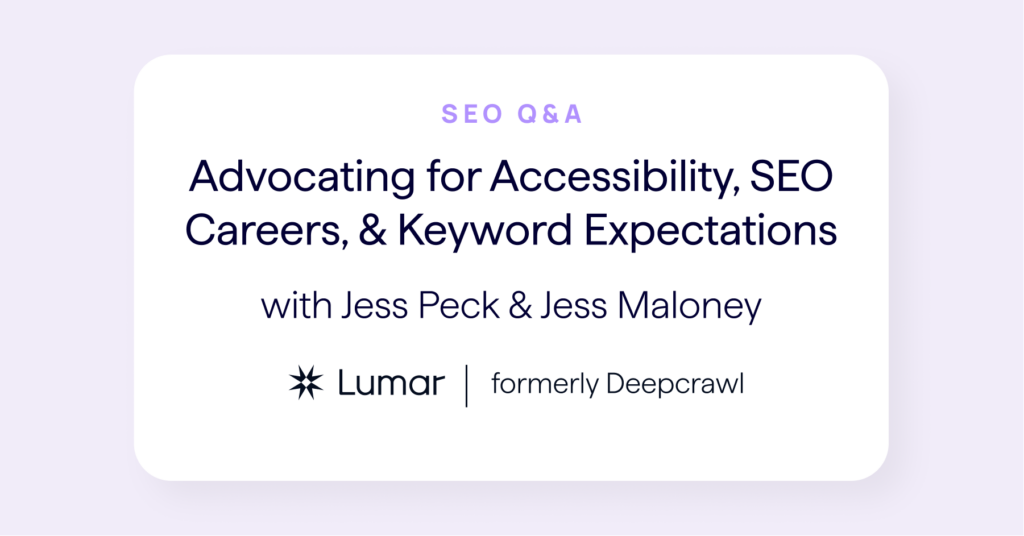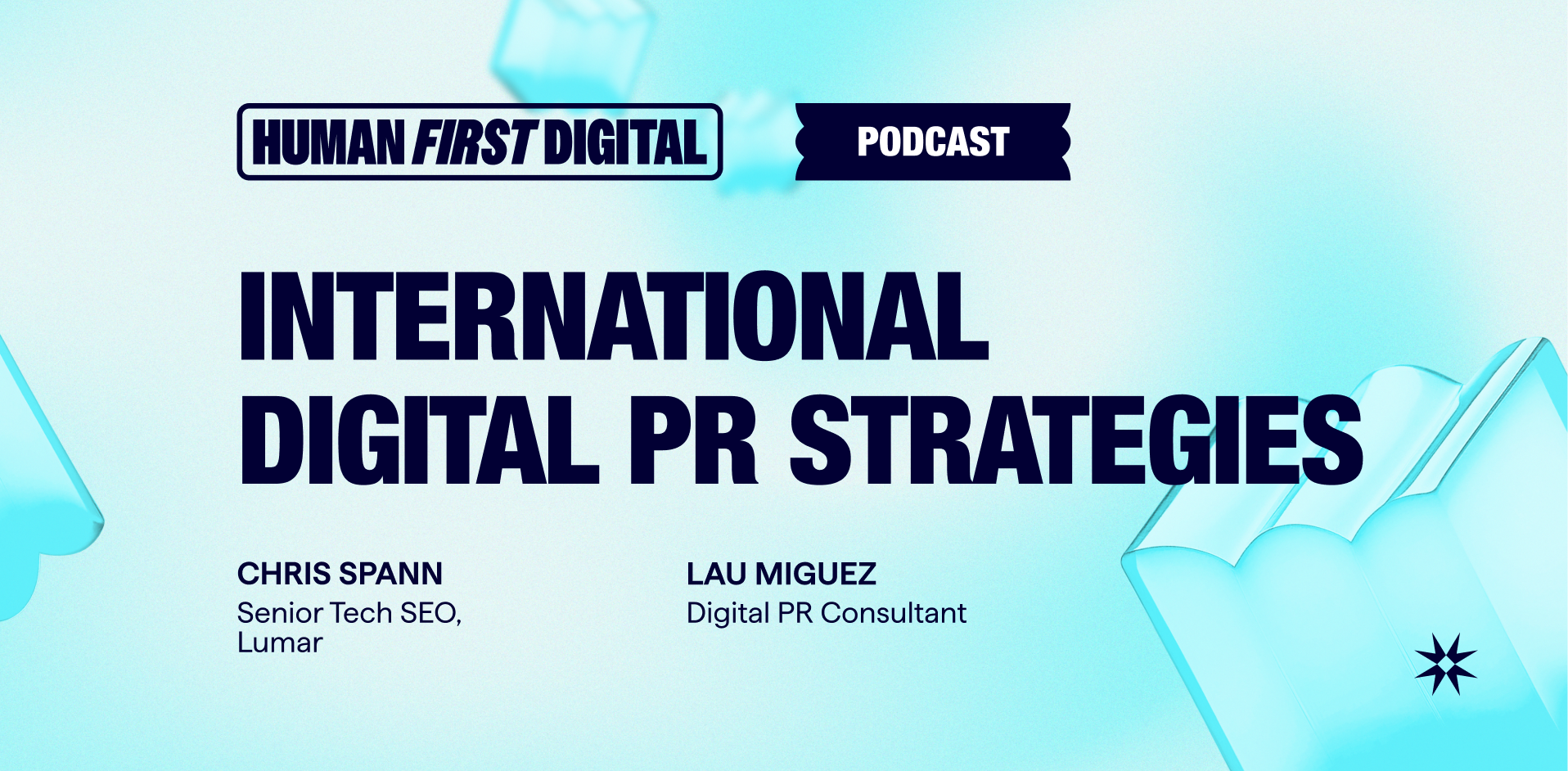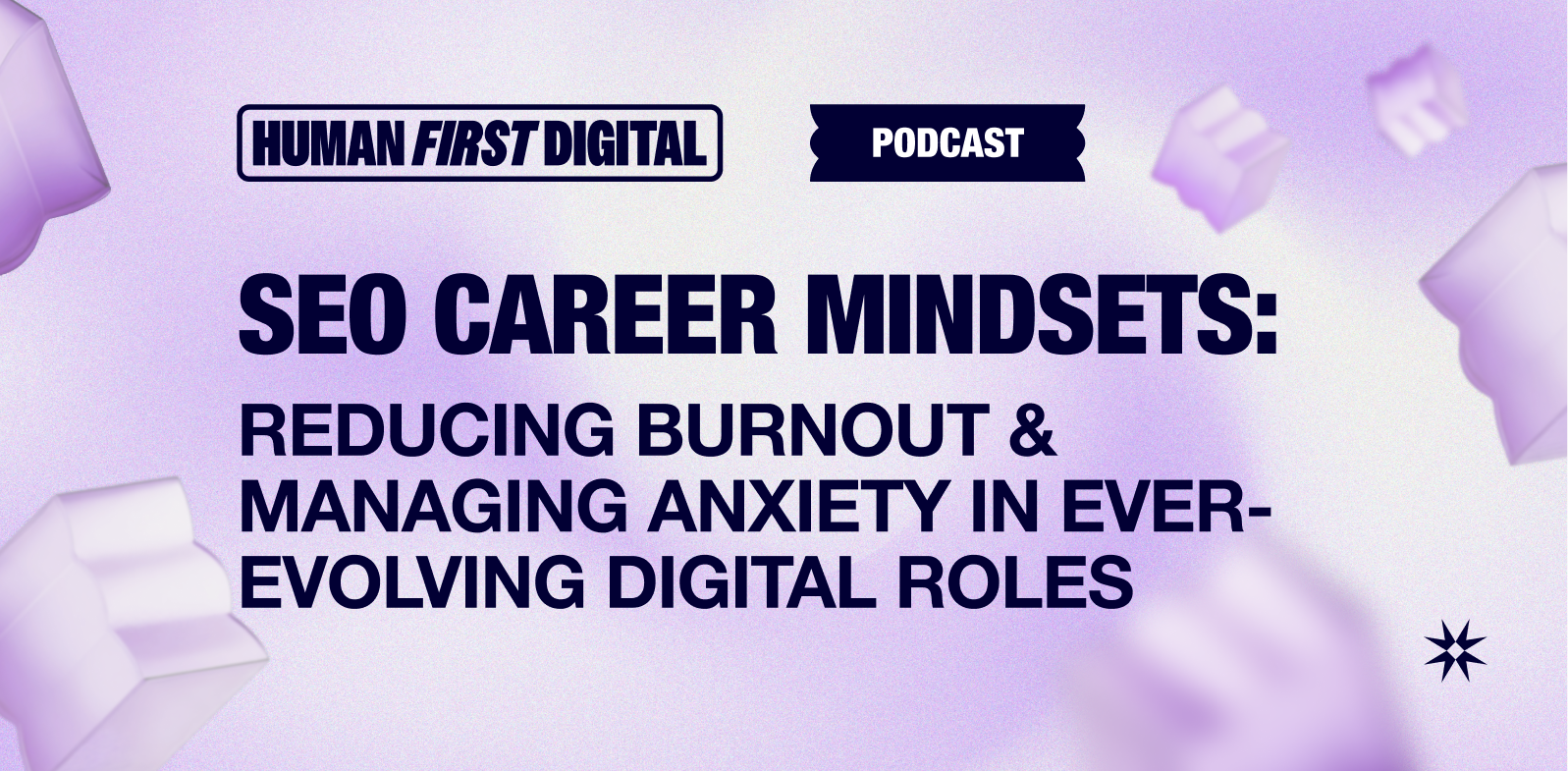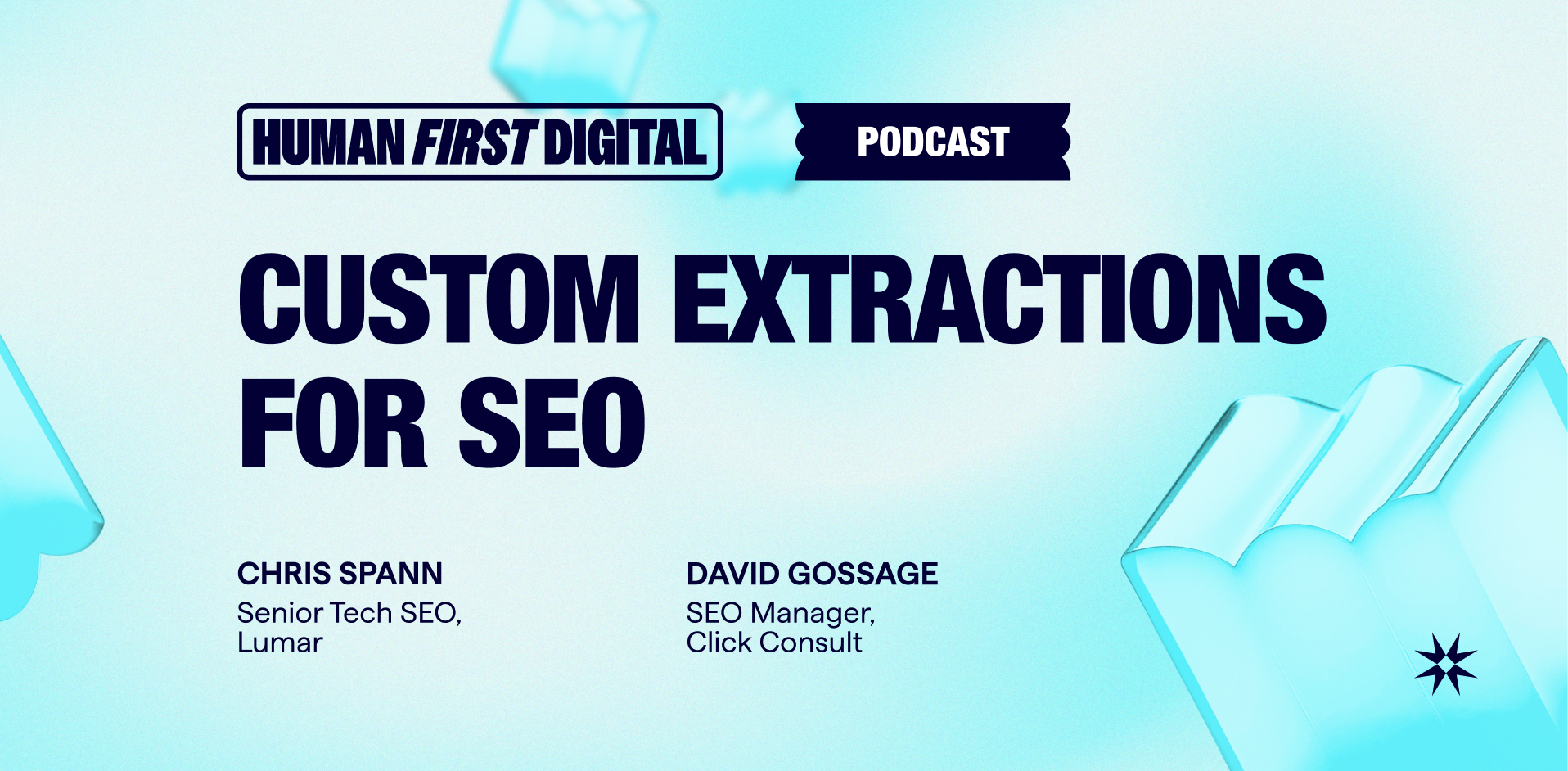This is the second in our series of interviews with first-time speakers at the 2022 BrightonSEO conference — with plenty more to come (watch this space in the coming weeks for the next round of SEO Q&As).
Lumar’s Jamie Indigo was on the ground at the conference, where they had many discussions with SEO industry experts to learn more about their unique career paths in SEO, what motivated them to begin speaking at industry events, and to dive deep into their specialized topics.
This week, we’re featuring two interviews — with Jess Maloney, SEO Partner at Open Partners, and Jess Peck, Machine Learning Engineer at Local SEO Guide.
Read on below for the audio & key moments from both of these discussions.
SEO Interview: Jess Maloney & Jamie Indigo — Impossible Keywords, Managing Expectations, & Common Issues in SEO Work
For our first in this week’s series of BrightonSEO interviews, Jamie chats with first-time speaker Jess Maloney, an SEO at Open Partners with a half-decade of search optimization experience. Have a listen to the full interview or read through the (abridged) highlight reel below.
Q: If you could pick a walk-on song for future talks, what would it be?
Jess M: Maybe Bohemian Rhapsody, I think that’s a great song to get people going. Bit of a long walk-on, but…
Q: What inspired you to take this on and start speaking at events like BrightonSEO?
Jess M: It was just to throw myself in the deep end. I used to be chronically shy, not anymore, but things like this are out of my comfort zone, so I figured, okay, let’s try to do something a bit out there.
Q: Are there any people you’ve watched speak at past events that have influenced you?
Jess M: There are so many great speakers I’ve seen at BrightonSEO. I think Greg Gifford is a great speaker, the way he entertains and entrances an audience with his references — he’s a great speaker.
Q: What’s your talk about?
Jess M: My talk is about managing expectations when a client comes to you with the impossible keyword; a keyword you know that their content is never going to rank for. It’s based on a case study of what’s happened to me and the steps we took to sort that— actionable tips that people can take away and use.
Q: What does it look like to manage expectations relating to a keyword?
Jess M: The search intent is massive — seeing what Google thinks is the search intent, because we may think it’s something different. An example I use is a client who came to me wanting to rank for a competitor’s name. It was never going to happen. But there are loads of different types [of impossible keywords] — it could be competitors’ names, mismatched search intent, or it could be just a website that’s got quite low authority and wants to for a really competitive term. It’s probably not impossible for that site forever, but at that moment in time, it would be impossible.
Q: How did you get into SEO, what does this career path look like for you?
Jess M: I think, similar to pretty much everyone, you just kind of fall into SEO! I was doing content before, doing copywriting. The agency I was working for started up an SEO team, completely new to them, and I joined that as it started and then just grew from there.
Q: What are common issues you run into in your day-to-day work in SEO?
Jess M: Some of the issues are related to managing expectations for clients, sometimes it’s a bit of lack of knowledge when they sold-in SEO; we have paid channels as well, so there can be a bit of mismatch in understanding what paid does, what SEO does, and where they kind of don’t mix.
Another issue is knowing which tools to use. We’ve got a set of tools at the minute; we use SEMrush, we use Ahrefs, but there are so many more that we could be using. There’s so much out there at the minute it’s very hard to pick the best ones!
Q: So how do you set expectations with clients?
Jess M: I just think being very open and honest with clients from the get-go. I like to educate clients about what we’re doing. Where I was previously, it was in a very small niche, all science companies, and traditionally their marketing managers are actually their product managers who haven’t done a lot of marketing or where they have, it’s mostly been offline marketing. So there’s a massive lack of knowledge around SEO in that industry. So really explaining what SEO is, explaining what you’re doing, how you’re doing it, and why you’re doing it just helps manage those expectations early on. I think with SEO as well, some people kind of think it can happen overnight, and we all know it doesn’t. It can be quite a long process, and I think it’s about outlining that from the get-go.
Q: What do you see as the biggest looming challenge coming for SEOs in 2022?
Jess M: GA4! Easy.
SEO Interview: Jess Peck & Jamie Indigo — Learning to Code as an SEO, How SEOs Can Advocate for Accessibility, and How to Build Allies Across Internal Teams
Q: What’s your role and where did you travel into BrightonSEO from?
Jess P.: I have traveled in from Boston, Massachusetts and I’m a Machine Learning Operations Engineer at Local SEO Guide— a very intimidating-sounding title!
Q: What was your BrightonSEO talk about and why is this subject important to you?
Jess P: My talk was about how to build a crawler and why you should give it a try —I’m trying to encourage people to do more code-y stuff [in SEO]. This is an important subject to me — when I was learning to code myself, I spent a lot of time being nervous that I was going to do something wrong, that everyone was smarter than me, that I couldn’t do math so therefore I could never code — all these kinds of things! So I wanted to make it accessible to people who might feel the same way as they are starting out.
Q: What inspired you to start speaking?
Jess P: So, my dad’s a clown. Like, a theatre clown! And I spent a lot of time doing theatre growing up. So being on stage, despite my nerves, is fun for me. It’s easier for me to talk to a room of 400 people than one-on-one in a hallway. And I really like sharing my enthusiasm around SEO.
Q: What has been your favorite BrightonSEO moment?
Jess P: Oh, there have been so many! A big one has just been being able to talk to people and geek out about SEO things; talking about Python stuff with people. After my talk, people came up to me and talked about what they were doing, learning Python. It’s really inspiring seeing how people here are all so enthusiastic about what they are doing.
Q: How did you get into SEO?
Jess P: I kind of fell into it! My undergraduate degree is in international politics, with a specific focus on humans rights abuses in the Middle East… But I also worked on the school’s website as an undergrad; that was my work experience. So when I started applying for jobs, I heard back from more people saying they needed someone who knew how to do [website] jobs, rather than people who knew how to do humans rights jobs. So I made a website for a company I was temping for, they liked it, and I kind of parlayed that into doing SEO full-time.
Q: How does your role fit into your larger organization?
Jess P: We have a DevOps team at Local SEO Guide; we have a bunch of SEOs, a bunch of content writers, and my job is to figure out how we can use more advanced data analysis techniques on the data we get. And I also work with the SEOs to know our superpowers, to know how we’re getting data and how we can use it.
Q: How do you make SEO allies across multiple teams?
Jess P: The important thing is knowing the language of the people you’re talking to; knowing what they think is important and then bringing that into other conversations to get cross-team collaboration. When I’m talking to the tech SEOs, obviously they’re going to think technical SEO is the most important thing [and the same with content or other teams] — like, you can have a beautiful website, but if you don’t have anything on it, it’s still not going to rank. And you can have all the good content you want, but if it’s on a bad website, people aren’t going to read it. So, I’m helping people make that connection [between teams].
Q: What’s your favorite thing about working in SEO?
Jess P: Honestly, the SEO community. I was pretty intimidated by it, but everyone’s very welcoming; everyone kind of vibes in a cool way, which is nice. There’s also always more to learn, and I really like figuring things out – I like going down rabbit holes to investigate bad websites, that kind of thing. There’s always more to learn and talk about.
Q: What do you think are the biggest challenges looming on the horizon for SEOs in 2022?
Jess P: I don’t know if this is the biggest necessarily, but I think Google is really trying to figure out ways to make UX more important. They’ve done experiments, like with CLS, that are experiments into more UX-based ranking factors that are not just page speed. And I think that’s something to look out for. If your user experience is bad, I feel like it’s going to become more of a thing over time.
Personally, I also want that to apply to accessibility. I would love there to be some accessibility metrics that people need to hit to rank. I know a lot of people who use screen readers and can’t look at the first ten results on the SERP if they Google stuff. It’s really important to me. I know a lot of people who use screen readers, or who only use the keyboard to navigate a page, or are color blind. I often feel like SEOs are in a really good position to advocate for making a website more accessible, not just to the robots, but to the people who are visiting the site. I really want people to start pulling that in — and that doesn’t mean you have to become an accessibility guru, but just keeping it in mind. There are some basic parts of an SEO strategy that can also help make things more accessible. It’s really important. I get migraines, and when I have one, I like to use a screen-reader—and there are certain sites that I won’t visit with a screen reader because it’s just like, AD! POP-UP! Or some piece of analytics script that for some reason is surfaced to the screen reader, so it reads each letter out. Then it makes my migraine worse, so I just skip those sites.
Q: Do you have any advice for people who are considering pitching for their first talk?
Jess P: It should be something you’re enthusiastic about. I think everyone’s enthusiastic about something. If you’re in SEO or in a related marketing or MarTech field, there is some part of that that you feel strongly about. It could even be how workers are treated in the industry, or diversity, or things that are part of our everyday working lives. If you feel strongly about that, if you have a point of view and have something to say, say it.
For more from Jess Peck, you can find her on LinkedIn and Twitter.
For more from Jess Maloney, you can find her on LinkedIn and Twitter.
For more from Jamie Indigo, find them on Twitter, or check out Lumar’s Professional Services team.





